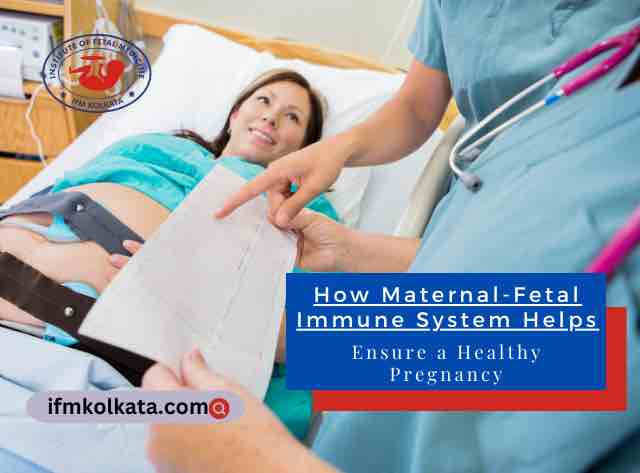Pregnancy is a beautiful and complex journey, filled with wonder and anticipation. It’s a time when a mother’s body nurtures and protects her developing baby. But have you ever wondered how the mother’s immune system, responsible for defending against diseases, knows not to attack the growing baby? In this article, we’ll explore the remarkable interplay between the maternal and fetal immune systems, shedding light on how they collaborate to ensure a successful pregnancy.
Basics of Maternal-Fetal Immunity
Pregnancy presents a unique immunological challenge because, under normal circumstances, the mother’s immune system’s primary job is to protect her from infections and foreign invaders. However, during pregnancy, there’s a delicate balancing act that occurs to ensure that the growing baby, which carries genetic material from both parents, is not mistakenly treated as a threat. This challenge is at the heart of maternal-fetal immunology, where nature has devised an incredible system to allow pregnancy to thrive despite these potential complications.
Immunological Challenge: At first glance, it might seem like the baby, carrying half of its genetic material from the father, should be seen as foreign by the mother’s immune system. However, nature has devised a clever system to prevent this.
Placental Barrier: Think of the placenta as a crucial mediator between the mother and the baby. It acts as both a protective barrier and a conduit for essential nutrients and oxygen. This remarkable organ ensures that the mother’s immune system doesn’t view the baby as an intruder.
Immunological Tolerance: The mother’s immune system undergoes a unique adaptation process. It learns to tolerate the presence of the baby’s genetic material and understands that, in this special situation, it should protect the baby rather than launch an immune attack.
Dynamic Interplay
Within the mother’s body, an intricate dance of biological interactions takes place during pregnancy. This dynamic interplay involves various elements of the maternal and fetal immune systems, working in harmony to ensure the well-being of both. It’s a bit like a well-choreographed performance, where different actors—immune cells, messenger molecules, and more—play their roles to perfection. In this section, we’ll delve deeper into this choreography and explore how the immune systems collaborate to create the optimal environment for a healthy pregnancy.
Immune Cells in Pregnancy: Specialized immune cells, including regulatory T cells and macrophages, play key roles in maintaining a harmonious balance between immune tolerance and protection. These cells communicate with the mother’s immune system, ensuring it doesn’t harm the developing baby.
Cytokine Messengers: Cytokines are like messengers in the body, and they play a pivotal role in the communication between the maternal and fetal immune systems. They guide the immune system, telling it when to protect the baby and when to respond to infections.
Challenges and Complications
When Things Go Awry: Sometimes, the delicate balance of the maternal-fetal immune system can be disrupted, leading to complications. Conditions like preeclampsia, which causes high blood pressure in the mother, and fetal growth issues can occur when the immune system doesn’t function as it should.
Infections and Immunology: Infections during pregnancy can alter the immune system’s equilibrium, potentially harming the baby. It’s essential to screen for and manage infections to safeguard both the mother and the baby.
Clinical Implications and Future Directions
Understanding the intricacies of maternal-fetal immunology has not only unlocked the secrets of successful pregnancies but has also led to important clinical applications. One such application involves medical interventions designed to manage and rectify immunological issues when they occur. These interventions can range from immunomodulatory therapies to personalized treatment plans. Beyond the current clinical landscape, ongoing research in this field continues to drive innovation.
Scientists and medical professionals are collaborating to explore novel approaches and cutting-edge techniques that promise to enhance our ability to safeguard the health of both the mother and the growing baby. In this ever-evolving field, the future holds the promise of even more precise and effective strategies for ensuring the well-being of expectant mothers and their little ones.
Medical Interventions: When complications arise due to immune system issues, doctors can step in with medical treatments. These interventions aim to restore the balance in the immune system, ensuring the baby’s safety and well-being.
Continuing Research: Scientists are continually expanding our knowledge of maternal-fetal immunology. Ongoing research seeks to unlock new ways to ensure the safety and health of both the mother and the baby, addressing immunological challenges with greater precision.
Final Words
The interplay between the maternal and fetal immune systems is nothing short of fascinating. It ensures that most pregnancies progress smoothly, culminating in the birth of a healthy baby. When complications arise, the medical community works diligently to find solutions. Understanding this remarkable teamwork enhances our appreciation of the intricate journey of pregnancy and the strides we continue to make in improving the experience for both mother and child.





